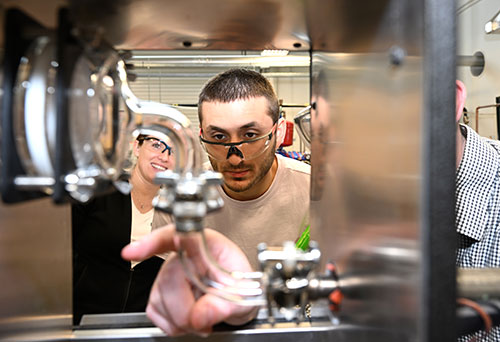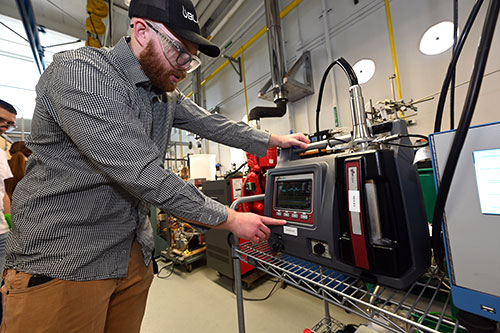- Home
-
Divisions
Energy Systems Division
- Grid Modernization and Security
- Energy Conversion
- Geothermal Materials
Energy Storage Division
- In-situ and Operando Analysis
- Vehicle Technologies
- Grid-level Storage
- Center for Mesoscale Transport Properties
- Long Island Solar Farm
- NSERC
- People
- Org Chart
Energy Systems Division
Cleaner Fuels
Emissions and Performance Measurement

From left to right: Rebecca Trojanowski and Stephen Galvin inspecting a sampling system used to capture particulate matter emissions from a range of heating technologies using both legacy fuels and emerging biofuels.
Brookhaven has facilities for testing the performance of current, emerging heating, and power-producing equipment with fossil fuels (natural gas and No. 2 oil) and market-ready biofuels. The Lab aims to develop high-quality, detailed estimates of emission factors and environmental pollutants for studied appliances and is collaborating with NYSERDA and the U.S. EPA for this project.
Component Compatibility and Degradation Testing
Brookhaven provides combustion and compatibility testing for legacy equipment, oxygenate studies, and storage stability tests for a wide range of biofuels, biodiesel, bio-oil, and fuel blends.
Energy Modeling

Jake Lindberg adjusting sampling parameters on an aerosol particle sizer, part of a suite of instrumentation used to measure health relevant characteristics of particulate matter such as its composition and size distribution.
Brookhaven has developed methods to quantify the energy savings associated with oil burner technology changes. This work accelerated the market transition to these now-dominant cleaner combusting burners, ultimately saving consumers $25 billion.
Technical Assistance to Policy Makers
Brookhaven compiled data on the benefits of transitioning heating systems to ultra-low sulfur heating oil. This effort provided significant technical support to New York State’s movement to reduce sulfur by 99% in 2012, resulting in drastic reductions in particulate and sulfur dioxide emissions and significant service and efficiency benefits. All other states using liquid fuel for heating have since made similar transitions.




